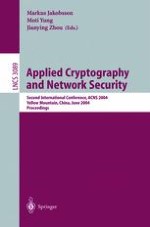2004 | OriginalPaper | Buchkapitel
Evaluating Security of Voting Schemes in the Universal Composability Framework
verfasst von : Jens Groth
Erschienen in: Applied Cryptography and Network Security
Verlag: Springer Berlin Heidelberg
Enthalten in: Professional Book Archive
Aktivieren Sie unsere intelligente Suche, um passende Fachinhalte oder Patente zu finden.
Wählen Sie Textabschnitte aus um mit Künstlicher Intelligenz passenden Patente zu finden. powered by
Markieren Sie Textabschnitte, um KI-gestützt weitere passende Inhalte zu finden. powered by
In the literature, voting protocols are considered secure if they satisfy requirements such as privacy, accuracy, robustness, etc. It can be time consuming to evaluate a voting protocol with respect to all these requirements and it is not clear that the list of known requirements is complete. Perhaps because of this many papers on electronic voting do not offer any security proof at all.As a solution to this, we suggest evaluating voting schemes in the universal composability framework. We investigate the popular class of voting schemes based on homomorphic threshold encryption. It turns out that schemes in this class realize an ideal voting functionality that takes the votes as input and outputs the result. This ideal functionality corresponds closely to the well-known ballot box model used today in manual voting. Security properties such as privacy, accuracy and robustness now follow as easy corollaries. We note that some security requirements, for instance incoercibility, are not addressed by our solution.Security holds in the random oracle model against a non-adaptive adversary. We show with a concrete example that the schemes are not secure against adaptive adversaries. We proceed to sketch how to make them secure against adaptive adversaries in the erasure model with virtually no loss of efficiency. We also briefly hint at how to achieve security against adaptive adversaries in the erasure-free model.
